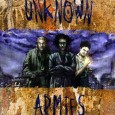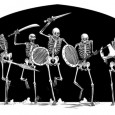Hi, and welcome back to the show! This episode I have two phenomenal GMs, Leonard Balsera and Todd Furler, on to talk about the rationale for running games either with low/no or very high prep, as well as their techniques for doing so.
Host: Sean Nittner
Guests: Leonard Balsera and Todd Furler
[00:26] Intro to the Show
[01:06] Introducing my guests Todd Furler and Leonard Balsera
[02:10] Todd and Lenny represent pillars of best practices for different methodologies for running games.
[03:10] Why choose one method or another? Reasons for high prep. Todd’s answer.
[09:33] Reasons for low/no prep games. Lenny’s answer.
[13:50] What the GMs get out of it.
[16:55] How it all happens? What are the techniques each GM uses?
[48:17] Dodging pitfalls. What to do if you find yourself unprepared in a low prep? How do you prevent high-prep games from railroading players.
Direct Download: NC_Episode_078.mp3


Excellent episode!
Since I’m looking to learn techniques for a more low prep, improvisational style of GMing (for Burning Wheel), I particularly enjoyed Lenny’s advice on Initial situation and 3 escalating complications, as well as his technique of presenting immediately relatable NPCs and getting the player group to develop interesting explanations for any unknowns.
Improvisational, low prep GMing is both frightening and yet immensely attractive, particularly for the surprise in how the game develops. I’ve grown tired of prepping so much for a game that when the time comes to actually play, I feel like I’m just going through the motions, as I’ve played every scenario out so many times in my mind already.
Anyway, my own techniques for low prep include:
1) First and foremost, the players are the stars of the show. Let go of my own need to tell a story and embrace the concept of telling the story that the players want to tell. This means automatic investment for the players, which then results in the GM getting the most emotional and energetic games possible. Give them the story that they want, focus your creativity in making it as intense, energetic and driven as possible. Get rid of the rails.
2) Discuss the setting and tone with the players. Have them come up with the setting (assuming your players are into this sort of thing). I have each player create his/her character and come up with the country/culture where he or she is from.
3) Ask for references to Movies, TV shows or books, to get an idea of the tone of the game. If you’re playing Spy Fiction, ask for references. You get much different tones if players ask for James Bond (Roger Moore), than if they want Jack Bauer (24), or if they want A-Team versus The Unit.
4) Pull as much stuff as you can from PC’s backstories, and make it central to the plot. Ask for players to come up with relationships and rivals, friends, family and enemies. Make these your own.
5) Ask players for Beliefs and Goals (a la Burning Wheel/Mouse Guard). Know what they want to do. Ask them to tell you a cool scene that they imagine their character doing. Riff off of that. It goes a long way if one of my players tells me (s)he’d like to see her/his character in a swordfight against 4 opponents at the same time on the deck of a ship, or infiltrating a monarch’s court during a masked ball.
6) Don’t build plots. Build anagonist NPCs with clearly defined goals. Make plans for them, as if there were no PCs to oppose them. Figure out what they plan, and then set the PCs on them. From then on, all you have to do is have the NPCs react to the PC actions, trying to get their plans back on track.
7) Make a library (mental, virtual or physical) of set pieces. Whenever inspiration strikes, jot down a few notes with any cool combat, location, NPC or encounter situations that come to mind. E.g. a rooftop battle at nighttime between rival criminal gangs, or a burial mound in the heart of a snow covered forest, haunted by its occupant, who animates his skeleton to battle any intruders, or a fat traveling merchant with 2 mules who sometimes carries wondrous enchanted items among his wares. Keep it short, simple and generic. Whenever you find yourself in a game, and in need of an encounter, you should have a mental library of stuff you can draw from on the spot and customize it to the specifics of the game you are running.
8) Organize any information dump-type of dialog into short bulleted lists, maybe on an index card, and improvise the rest of the conversation.
Sorry for the long rant, but this is a subject of great interest to me! Thanks for the show, and keep ‘em coming.
Wonderful episode, great stuff from all the contributors.
It seems to me that this episode needs a follow up on how to fame scenes well.